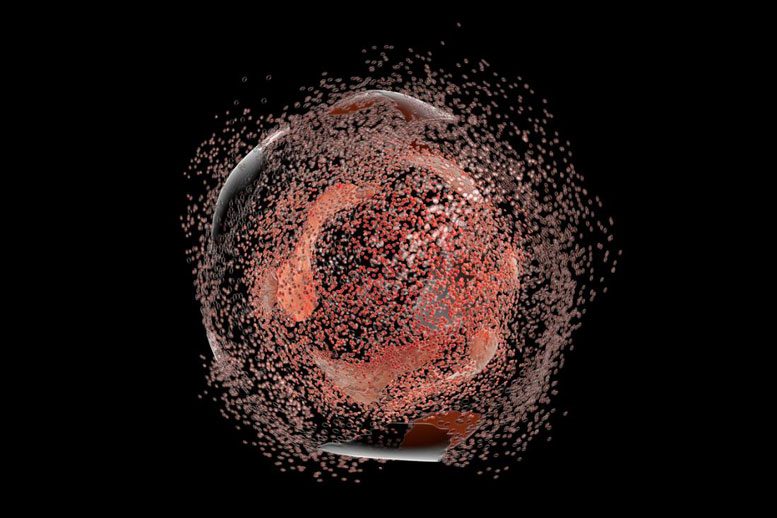
Researchers from Case Western Reserve University School of Medicine have discovered a way to stop immune cell death associated with multiple diseases, including sepsis, inflammatory bowel disease (IBD), and arthritis.
The findings, published in the journal Science Immunology, identify a chemical that potently inhibits inflammatory cell death. Cells often perforate their own membranes in response to extreme inflammation—a type of cell suicide known as pyroptosis. In human cells and animal models, the chemical prevents these deadly holes from forming inside cell membranes. This is a new pharmacologic approach to stopping this destructive process.
“To date, there has been no pharmacologic mechanism to directly inhibit pyroptotic pore formation,” said Derek Abbott, MD, Ph.D., Arline H. and Curtis F. Garvin Professor of Medicine at Case Western Reserve School of Medicine and member of the Case Comprehensive Cancer Center, whose lab performed the work. “We knew necrosulfonamide inhibited another type of pore formation and had a hunch it might work against pyroptosis, too. We found necrosulfonamide is effective in our sepsis models, and could be effective to treat diseases worsened by inflammation.”
In the new study, mice treated with the chemical necrosulfonamide survived longer than untreated mice, after exposure to bacterial proteins that cause inflammation. The results suggest the chemical alleviates extreme, harmful inflammation associated with bacterial sepsis. Necrosulfonamide has never before been studied as a pharmacologic agent.
Pyroptosis is part of a vicious cycle in many diseases. As dying cells poke holes in their membranes, they leak molecules that recruit more immune cells. The sudden influx of new cells also initiates cell death, and another round of pyroptosis occurs. Chronic inflammation can result, including the type that underlies arthritis and IBD. Abbott, who is also a professor of pathology and Co-Director of the Medical Scientist Training Program (MSTP) at Case Western Reserve School of Medicine, and his team sought a way to stop pyroptosis while preserving other necessary immune cell functions.
The researchers tested necrosulfonamide by adding it to human cells growing in their laboratory. Even in the face of inflammatory triggers, like bacteria, immune cells exposed to the chemical remained intact. They did not leak dyes or other molecules, and still sent signals to other cells as part of normal, healthy function.
The new study also describes how necrosulfonamide works inside cells. Abbott’s team used biochemical analyses to show it directly attaches to gasdermin D—a protein that destroys cell membranes. During pyroptosis, long chains of gasdermin D aggregate inside cell membranes, forming pores. Necrosulfonamide physically gets in the way of this process. With the large chemical attached to it, gasdermin D can’t aggregate.
The researchers studied different gasdermin D variations to pinpoint the exact location where necrosulfonamide attaches. They found it attaches to regions where gasdermin D proteins connect to each other. The specific attachment mechanism differs from how the chemical inhibits enzymes involved in other types of cell death.
“Our results suggest gasdermin D inhibitors are clinically possible,” said Joseph Rathkey, first author on the study and student in the MSTP at Case Western Reserve School of Medicine. “We’ve provided proof of principle that destructive pore formation can be inhibited, and that gasdermin D is a viable pharmaceutical target.” He says the “high therapeutic potential” of chemicals like necrosulfonamide could inform future studies in humans.
Reference: Joseph K. Rathkey, et al., “Chemical disruption of the pyroptotic pore-forming protein gasdermin D inhibits inflammatory cell death and sepsis” by Joseph K. Rathkey, Junjie Zhao, Zhonghua Liu, Yinghua Chen, Jie Yang, Hannah C. Kondolf, Bryan L. Benson, Steven M. Chirieleison, Alex Y. Huang, George R. Dubyak, Tsan S. Xiao, Xiaoxia Li and Derek W. Abbott, 3 August 2018, Science Immunology.
DOI: 10.1126/sciimmunol.aat2738
Funding for this research was provided by the National Institutes of Health (NIH) grants T32 GM007250 (to support J.K.R., B.L.B., H.C.K., and S.M.C.) and F31 NS 096857, T32NS077888, and TL1 RR024991 (to support B.L.B.). G.R.D. was supported by NIH grant R01EY014362 and National Muscular Dystrophy Association grant NMSS RG5130A2/1. X.L. was supported by NIH grant P01HL029582 and National Multiple Sclerosis Society grant RG-1707-28180. This work was further supported by NIH grants P01091222 and R01086550 and a Harrington Discovery Institute fellowship to D.W.A.
1 Comment
Is anyone asking questions about the effects of prolonging lifespans of inflammation stressed cells while leaving the inflammatory stressors intact?